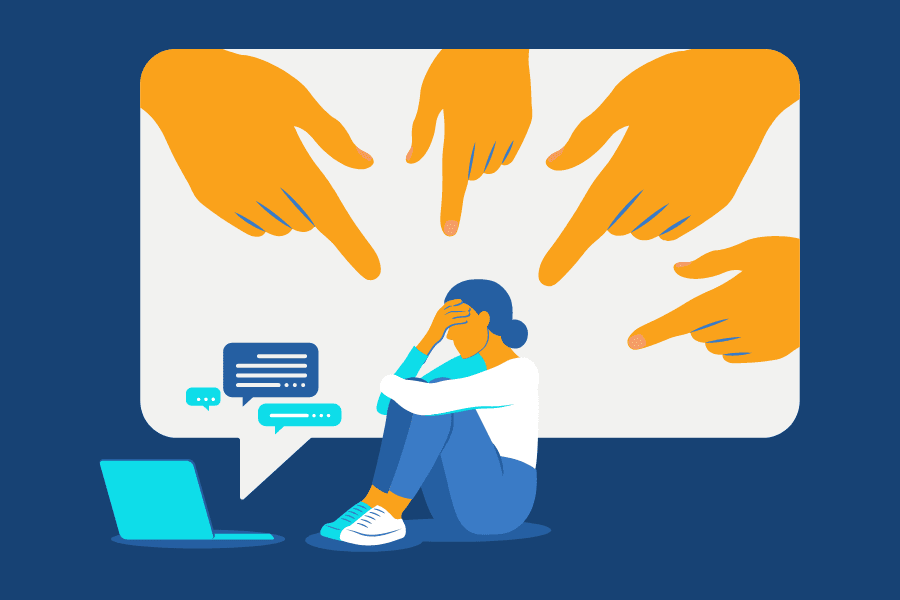
Bullying is a deliberate negative behaviour that targets the victim with physical violence, verbal insult, and emotional blackmail, which leads to social isolation and even suicidal thinking among the weak. Unfortunately, social media contributes to the spread of bullying, especially when some people create fake accounts to target and bully others or spread false news without disclosing their identities.
By Noura bint Faisal Al-Shaaban
Have you ever been bullied? We've all been forced at some point in our lives, but the question is: what were our reactions? We either gave up or got broken, so we now feel wrong about our society. Bullying has become part of our behaviour, reactions, and anger that we suppressed at that time to later project it onto those around us, or we understood and realised the stage we were going through.
Then, we decided to confront bullying, deal with its effects, and ultimately reject it for ourselves and others because we realised the magnitude of its risks and took the responsibility to build a psychologically healthy generation.
I have been the target of several bullying campaigns that have made me suffer. I wondered why some people tend to bully others. I discovered multiple and complex reasons for bullying, as bullies may have psychological disorders, low social acceptance, schizophrenia or psychological deviations, such as narcissism or the tendency to control others.
Thus, bullying is used to show their strength and achieve social excellence. However, I realised that they hide painful experiences and do not have self-confidence, and though some of them have diverse capabilities, they are skilled in using them negatively.
Allah Almighty said: (And those who annoy believing men and women undeservedly bear on themselves the crime of slander and plain sin); regardless of the leading causes of bullying, it is impossible to justify or accept this destructive behaviour. Bullies should be faced by all concerned parties to end their behaviours and change the environment in which they grow.
Therefore, raising awareness of the problem of bullying and educating the entire community about its effects and how to address it is one of the most important basic steps. This also provides psychological support for both the bully and the victim. Bullies can benefit from therapy sessions to develop their social skills.
As for the victims, they may need psychological support to boost self-confidence, stop the control bullies have over them to have complete control over themselves, and most importantly, put bullies’ behaviours within the proper framework, guide them towards the correct behaviour, and decide the best ways for them to interact positively with others.
A fair system that punishes bullies and encourages change in their behaviour by giving appropriate penalties and rehabilitation, if necessary, will deter them and limit their harm. The question raised now is, can a bully become an influencer?
Turning a bully into an influencer may be a complex process that needs a lot of patience and understanding. Everyone can bully others, but what stops us is undoubtedly the principles of humanity, morality, and a sense of responsibility.
It may not be possible to turn all bullies into influencers. But, with deep professional help and by maintaining psychological well-being, self-confidence, and the ability to express an opinion clearly and respect others, and then by communicating and establishing a dialogue with bullies to understand their motives and reasons for their behaviour, in addition to presenting influential models, we can change some of them.
There may be personal matters they face or difficulties that are the reason behind their negative behaviour; they may need someone to listen attentively to their feelings and experiences, and they may be unaware of the impact of their behaviours on their victims.
When Thomas Edison was a child, professors and all those around him used to tell him how dumb he was and that he would never succeed in his life. By not listening to the words of bullies, and after exerting great efforts and focusing on his goals, he became one of the greatest inventors in history with his 1300 great inventions, including the electric lightbulb, that has changed our lives.
When Edison was asked one day about the thousands of failures he faced when inventing the lightbulb, he said: (I didn't fail; I discovered 10,000 ways that don't work). Indeed, this man's success lit up the whole world.
Nourah Alshaban, a Former Saudi Shura Council member, specialising in business development and public relations. She spoke about creating positive change at more than 35 international and 50 regional conferences.
